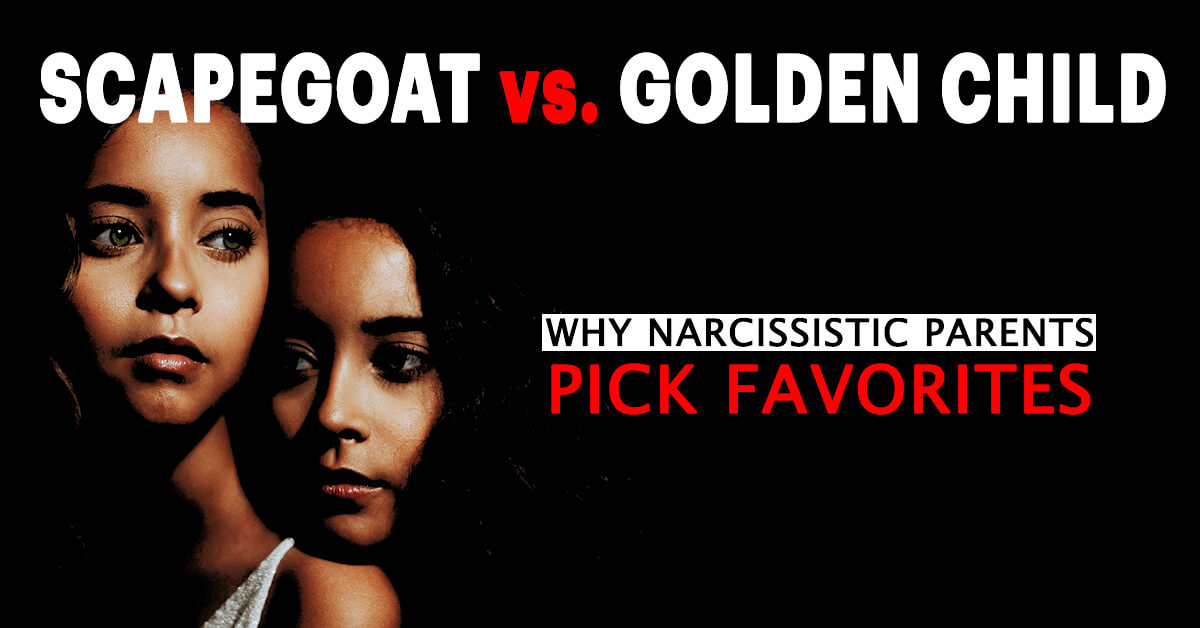Even in single-child families, the narcissistic mother will find a golden child to compare her “scapegoat” with! This can be the neighbor’s kid that went to a “better” college, your friend with the “better” girlfriend, or your cousin with the “better” job.
In multiple-child families, the scapegoat and golden child roles can also switch occasionally, depending on which child “obeyed” the narcissist’s wishes more.
If you’re living with a narcissistic parent, it’s essential to learn the roles they assign you and break the cycle of abuse and manipulation.
So, let’s explain the scapegoat vs. golden child phenomenon in depth, learn why it happens, and, of course, figure out the best way to “escape” your role.
What Is “the Scapegoat”?
In general terms, a scapegoat is a person that’s typically blamed for everything, even when it’s not their fault. In terms of a family with a narcissistic parent, the scapegoat is typically the “least favorite” child or the one that does everything wrong. Instead of taking responsibility for their actions and admitting their wrongdoings, the narcissistic parent will place the blame on the scapegoat child.
Narcissists are known for projecting their own feelings onto people, and, unfortunately, the scapegoat child is the easiest target. They practically use the scapegoat to project their own insecurities and shame.
What Is “the Golden Child”?
Contrary to the scapegoat, the golden child is the exceptional one in the family and the one who always does everything right. In other words, the golden child is the favorite child of the narcissist. Unlike the scapegoat who’s always blamed, the golden child is always praised.
With all this in mind, being the golden child in a family with a narcissistic parent can also be challenging. These children have to be extraordinary and not make any mistakes if they want to remain in the narcissist’s good grace. This pressure of being perfect is what makes life difficult for the golden child.
In a way, the narcissistic parent uses the golden child as someone who can achieve their unfulfilled dreams or ambitions.
Am I the Golden Child or the Scapegoat?
Now that you know all this, it’s time to see if you’re the golden child or the scapegoat in your family. Here are some signs to look for:
You’re the scapegoat if…
- You’re always the one to be blamed for everything.
- Your narcissistic parent always compares you to the better sibling, a.k.a. the golden child.
- You feel like the narcissistic parent never cared about your emotional (or even physical) well-being.
- You feel like everything you do is wrong in the eyes of the narcissist.
- Feeling like you’re not good enough or smart enough.
- The narcissistic parent often dismisses you, ignores you, or tries to ridicule you.
- You’re isolated from the rest of the family and feel like the “black sheep” that nobody can understand.
- Your failures are always a much bigger deal than your accomplishments.
- You’re always getting blamed for something that the golden child did.
- You’re blamed for every problem that arises in the family, even when it has nothing to do with you.
You’re the golden child if…
- The narcissistic parent always forgives you and is more patient with you.
- You feel like you have to do everything perfectly to live up to the high standards and expectations of the narcissistic parent.
- Your achievements and accomplishments are always praised and celebrated, no matter how small or insignificant.
- You often feel superior to your siblings in the way the narcissistic parent treats you.
- Your narcissistic parent often tries to turn you against your sibling (the scapegoat).
- All of your failures are blamed on the scapegoat.
- You feel a loss of your sense of self and feel like your parent’s extension.
- You’re afraid of failure and are often anxious wondering if you did things perfectly, as expected by the narcissistic parent.
- You’re extremely self-critical.
- You feel guilty for the mistakes you did that were pinned on your scapegoat sibling.
Long-Term Effects of Being the Scapegoat
If you’re the scapegoat of your family, these are some of the long-term consequences you might face from years of unresolved trauma and abuse:
- A negative self-image
- Low self-esteem
- Self-loathing and feeling worthless
- Anxiety
- Depression
- Anger issues
- PTSD
- Addiction problems
- Eating disorders
- Self-sabotaging behaviors
- Imposter syndrome
- Pleasing others and avoiding conflict at all costs
- Fear of failure and giving up before trying
Long-Term Effects of Being the Golden Child
Contrary to popular opinion, golden children don’t always have it easy, especially in terms of long-term consequences:
- Undeveloped self-identity
- Unstable and insecure attachment styles
- Relationship problems
- Narcissistic traits and a tendency to develop Narcissistic Personality Disorder (NPD)
- Perfectionism and self-criticism
- Unjustified entitlement or superiority
- Poor boundaries with the narcissistic parent
- Inability to make independent decisions
- Anxiety
- Guilt feelings due to the inequity between siblings
Why Do Narcissistic Parents Assign These Roles to Children?
One word – PROJECTION.
According to a 2020 research paper on children brought up by narcissists, the goal of the narcissistic parent isn’t to deal with problems, but to cover them up. And the best way to do that is by projecting them onto their children.
Underneath the carefully-planned facade, the narcissist is deeply insecure and in desperate need of attention and ego-boosting. So, they have to find a way to dismiss or get rid of these feelings of worthlessness. Enter – PROJECTION.
Projection is a defense mechanism that lets narcissists take everything they hate about themselves and dump it on another person, typically the scapegoat.
The same paradox applies to the golden child – they have to be the manifestation of the narcissistic parent’s unfulfilled dreams and ambitions. Everything that the narcissist wanted to achieve now gets projected on the golden child. They’re obliged to make their narcissistic parent proud.
The Relationship Between the Scapegoat and the Golden Child
The scapegoat and golden child are at different ends of the spectrum. The typical “good kid” vs. “bad kid” story – the black sheep vs. the star of the family. Considering that the scapegoat and the golden child have probably been turned against each other from birth on, their relationship can range from non-existent to completely abusive.
The dynamics between the scapegoat and golden child as adults can also be tricky, typically ruled by the following emotions:
- Guilt
- Constant comparison
- Jealousy
- Lack of support
- Resentment
- Extreme competitiveness
FAQs about the Scapegoat vs. the Golden Child
Let’s cover everything on the subject of scapegoat vs. golden child. We’ll go over some of the most frequently asked questions on the dynamic between the scapegoat and the golden child.
Is the Golden Child Mean to the Scapegoat?
The golden child is practically raised and “trained” to be the opposite of their scapegoat sibling. Often, this results in the golden child adopting narcissistic tendencies and behaviors and starting to treat their scapegoat sibling badly. On top of that, the narcissistic parent is usually doing a good job of pitting the siblings against each other.
Sometimes, the golden child can become aware of this family dynamic and break away from the narcissist’s expectations (at which point they become the scapegoat by default).
Does the Golden Child Hate the Scapegoat?
The golden child doesn’t necessarily hate the scapegoat as much as they’re trained to work against them or dismiss them. In fact, golden children often feel a sense of inequity, resulting in guilt.
Having said that, it’s important to know that in some families, the golden child will adopt many of the narcissist’s traits. Eventually, they become a carbon copy of the narcissist. In this case, it’s not uncommon that their actions feel like “hate” from the scapegoat’s perspective.
Who Suffers More: the Scapegoat or the Golden Child?
The answer to this question is largely subjective. At first glance, it might seem like the scapegoat is the one that suffers more because of all the unfairness and mistreatment. But, the highlight in the case of the scapegoat is that they’re typically the more aware sibling. This allows them to break free from their narcissistic parent much sooner and form their own sense of self, designing life as they want. This is an underrated freedom that the golden child can’t always enjoy!
On the other hand, the golden child is the one that often suffers more in the long run, mainly due to being unable to fulfill the high expectations of the narcissistic parent.
Furthermore, narcissistic parents practically groom the golden children to become narcissists themselves, or at least adopt some of their behaviors. This makes life much harder as they grow older as they end up forming unhealthy relationships and treating people badly. In this way, golden children practically carry on the intergenerational trauma and cycles of abuse.
Can the Golden Child Become the Scapegoat?
Absolutely! Being the golden child always comes with ties attached and tons of conditions, but it all sums up to this – you have to be perfect in the eyes of the narcissistic parent, obey their orders, and follow in their footsteps. After all, the parent knows best, right? WRONG!
As soon as the golden child breaks one of the rules or doesn’t act in a way that’s good enough for the narcissist, they can quickly become the scapegoat. The narcissistic parent will often change the roles between siblings, thus allowing them to manipulate and gaslight both sides.
What Happens When the Golden Child Leaves the Home?
The problem with being the golden child in a narcissistic family is that you might never leave! The golden child is groomed from birth on and their entire life plan has been designed and structured in advance – courtesy of the NPD parent! With the narcissist so closely involved in the life of the golden child, it becomes difficult for the golden child to become independent and form healthy relationships.
In the rare event that a golden child leaves the home and cuts ties with the narcissistic parent, they’ll have to work on overcoming the golden child syndrome and their sense of entitlement. Otherwise, they’ll form unhealthy attachments and struggle to maintain relationships later in life.
What Happens to the Golden Child when the Narcissistic Mother Dies?
Unfortunately, when the narcissistic mother or parent passes away, they typically leave the golden child with no sense of self-identity, hit by the harsh reality of how “average” the world treats them. Additionally, narcissists always aim to be the most important people in the life of the golden child, which further increases their helplessness when they’re left alone.
The lack of independence in the golden child’s life is the main culprit preventing them from thriving after the loss of a narcissistic parent.
Wrapping Up
The dynamics of scapegoating and favoritism within families with narcissistic parents shed light on the destructive impact of these patterns on children’s lives. Narcissistic parents often employ these tactics as a means to bolster their own fragile self-esteem and maintain a sense of control and superiority over their offspring.
By designating a scapegoat and a golden child, they create an unhealthy power dynamic that perpetuates emotional abuse, manipulation, and division among siblings.
The scapegoat experiences blame, rejection, and low self-esteem, while the golden child receives praise but may struggle with entitlement, identity, and empathy later in life.
Escaping the scapegoat vs. golden child dynamics requires support, self-compassion, and establishing healthy boundaries. Raising awareness is crucial to break the cycle and promote the well-being of all children.
For an insight into my personal experience breaking contact with my narcissistic mother as well as healing techniques and methods, check out my guide LEAVING HELL – Escaping the Toxic Chains of a Narcissistic Mother.





